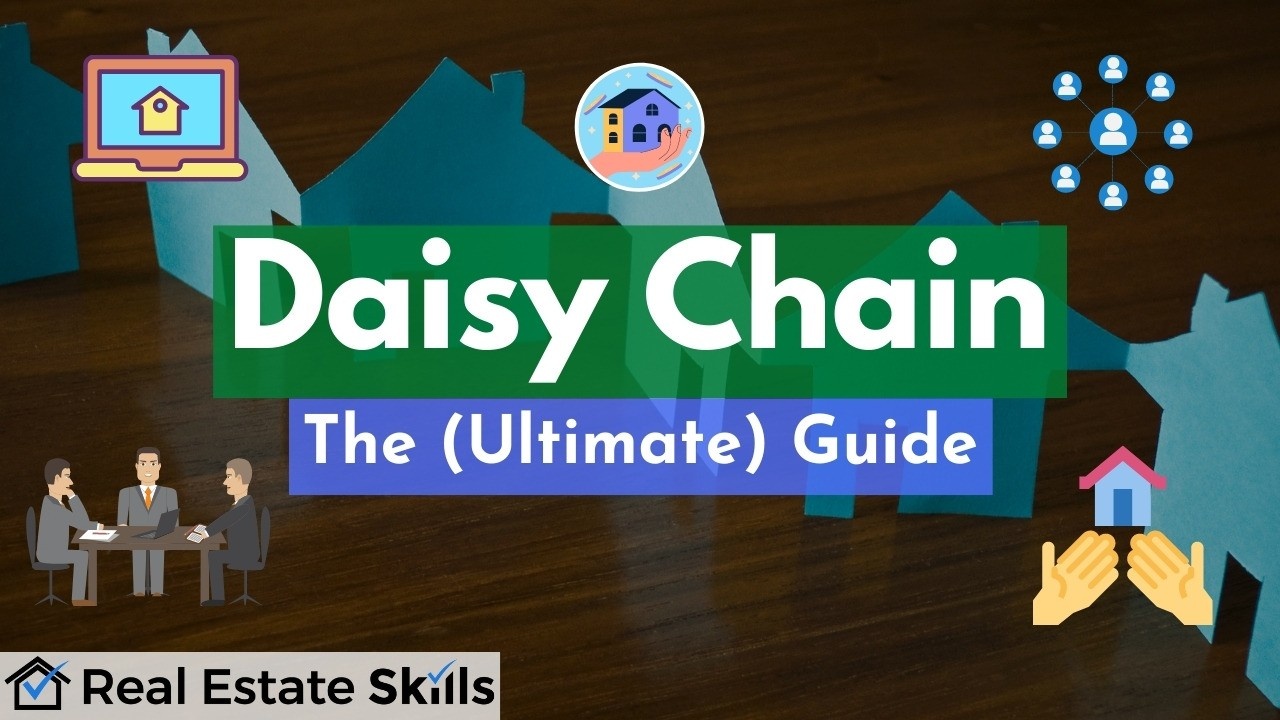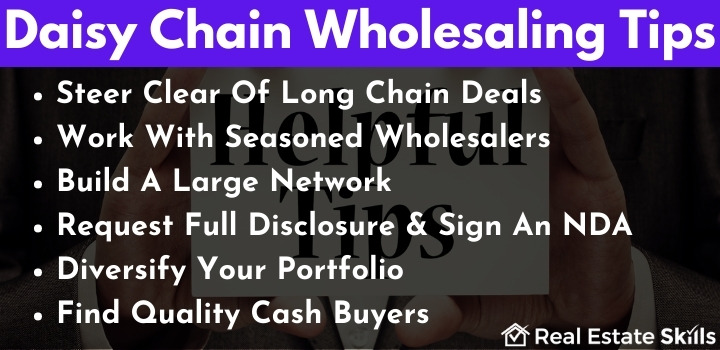
Daisy Chain: The (ULTIMATE) Guide
Aug 16, 2022Daisy chain wholesaling has been rapidly gaining momentum in real estate investing. But before you dip your toes in it, what exactly is daisy-chaining wholesaling? Is it as lucrative? What does one need to venture into this area of investing?
Here’s a guide covering everything about it to determine whether it’s worth the hype.
- What Is A Daisy Chain?
- What Is A Daisy Chain In Real Estate?
- How Does A Daisy Chain Work?
- Daisy Chain Wholesaling: What To Expect?
- Why Do Wholesalers Daisy Chain Properties?
- Daisy Chain Real Estate: Pros And Cons
- Final Thoughts
Ready to Take the Next Step in Real Estate Investing? Join our FREE live webinar and discover the proven strategies to build lasting wealth through real estate.
Whether you're just getting started or ready to scale, we'll show you how to take action today. Don't miss this opportunity to learn the insider tips and tools that have helped thousands of investors succeed! Seats are limited—Reserve Your Spot Now!
What Is A Daisy Chain?
A daisy chain means different things to people in different fields. At its simplest, it’s a string of daisies linked together to create a ring or chain typically worn by women at festivals.
In the computer world, it is a wiring schema with multiple linked devices in a given sequence while in stock investments, it’s a scam by a group of investors who simultaneously purchase a stock together to artificially increase its value.
Generally, a daisy chain is a series of interconnected things or events. Find out what it means to a real estate investor below.
What Is A Daisy Chain In Real Estate?

A daisy chain is created in real estate when a wholesaler signs a contract with a property owner and assigns it to a second wholesaler, who does the same, and so on.
Daisy chain real estate is a type of residential real estate wholesaling that has exploded in recent years. Given the unprecedented demand for single-family housing, condos, land, and even mobile home investment properties, the opportunity for beginner and experienced wholesalers to daisy chain other wholesalers' deals has never been more real.
How Does A Daisy Chain Work?
In real estate, a daisy chain takes place when wholesaler (A) agrees, and signs a wholesale contract with a property owner, assigns it to another wholesaler (B) who then marks up the price, and either finds a buyer or transfers it to another wholesaler (C), and so on.
With each new wholesaler involved comes a higher price markup. Once the deal is closed, everyone gets to pocket the difference as their fee and profit, while the property owner receives the original contract sale price. Check out the simplified breakdown below:
Seller (property owner)
↓↓↓
Signs deal with Wholesaler A agreed price- $100,000
↓↓↓
Wholesaler B takes over the contract for $100,000+$3000
↓↓↓
Wholesaler C for $103,000+$5000
↓↓↓
The buyer purchases the property for $108,000
Note: Although they hold excellent potential profitability, real estate daisy chains aren’t always easy to navigate. A wholesaler’s other partners, for instance licensed real estate agents or disposition agents, might be involved.
Read Also: Wholesale Real Estate Salary: How Much Can You Make Wholesaling?
Daisy Chain Wholesaling: What To Expect?
Daisy chains hold excellent profitability. They’re also a great source of leads, especially for novice wholesalers seeking to build their lead lists. It allows them to gain experience from seasoned wholesalers, and capitalize on their established sellers, and buyers lists to build their own.
And because daisy chain deals involve working with other like-minded investors, they create great networking opportunities for both novice and seasoned wholesalers.
However, daisy chain wholesaling isn’t all sunshine and rainbows. There are virtually no limits to the number of wholesalers who can get involved making it difficult to identify who controls the deal.
Additionally, most buyers are likely to go to the wholesaler with the most affordable offer in the chain, meaning other wholesalers may lose out on their fees, despite investing time, and energy into real estate marketing. It’s also not unusual for wholesalers to close the deal without informing other involved investors. This leaves other parties marketing a property that’s already been sold.
Some buyers on the other hand find daisy chain deals confusing, and will walk away the minute they pick a whiff of one.
But as mentioned, daisy chains are profitable if done right. The key lies in learning to differentiate, the good, from the bad deals. Here are some tips to keep in mind when scouring the market for a legit, daisy chain deal:

Steer Clear Of Long Chain Deals
Daisy chain deals become complicated when the chain is long. This is often because it’s difficult to identify who controls the deal and communication barriers are created whenever a new wholesaler joins in. So, if you’re looking to find great deals in the real estate market, stay away from long daisy chain deals.
If possible, only take part in chain deals with three-to-five parties. That is the seller, original wholesaler (contract owner), wholesaler B (informs you about the deal), you, and the buyer.
This way it’s easy to identify who controls the deal, reduce the number of real estate transactions and ensure a smooth communication flow.
Read Also: 17 Best Cities To Wholesale Real Estate
Work With A Seasoned Wholesaler
Scouring the MLS, and other property lists is an excellent way to find daisy chain deals, but for even more lucrative, and legitimate wholesale deals, partner with a seasoned wholesaler. As an established investor, such a wholesaler will often have a solid base of sellers, and flowing deals, and is only looking for buyers.
A partnership with them unlocks your access to not one but continuous legitimate daisy chain deals. It also lets you tap into their network with other real estate professionals, such as real estate agents, who might be a good source of other wholesaling deals.
Search experienced wholesalers near me, or wholesalers in (your city) on Google to find wholesalers you can partner with, or browse sites like:
- Your local MLS
- Craigslist
Once you find one, conduct background research to confirm they’re indeed experienced and ethical.
Build A Relationship With Other Wholesalers And REI Players
If you choose to find daisy-chaining deals independently, build a relationship with other wholesalers, and real estate investing professionals. This way, they’ll let you in on good daisy chain deals that suit your target profile, and vice versa.
Plus, if you plan to daisy chain for the long term, it’s better to work with wholesalers and real estate professionals you know rather than new ones. Additionally, having great relationships with parties in this wholesale deal enhances and ensures effective communication.
Always Request A Full Disclosure And Sign An NDA
There have been instances where a wholesaler involved in a daisy chain closes the deal without informing others. In other cases, some parties involved might try to go behind others' backs to close the deal.
In that light, always request a full disclosure of all the parties in a daisy chain, and sign a binding nondisclosure agreement (NDA) so everyone involved does the right thing.
If you work with a single seasoned wholesaler, decide how you’ll work out profits and share responsibilities from the get-go.
Diversify Your Portfolio
As a second or third wholesaler, you only get to keep the difference as your assignment fee and profits, lowering your earning margin.
To benefit from daisy-chaining, consider diversifying your target market to include various properties to ensure proper deal and cash flow.
Finding Buyers
Here are some tips for finding buyers when daisy-chaining:
Build A Cash Buyers List
A cash buyers list features the contact information of buyers who bought properties for cash within a particular zip code over the past 12 months. Most of these cash buyers are other real estate investors and tend to invest in distressed properties or foreclosures for a profit.
That means they’ll be interested in a good deal when they find one which is why it’s paramount a wholesaler in a daisy chain needs a good cash buyers list they can turn to for a quick sale.
You can build a buyer’s list by joining a local REIA for networking, working in tandem with other wholesalers in a chain, or meeting buyers at real estate auctions.
Capitalize On Craiglist
Craigslist attracts numerous real estate buyers and sellers every day. It’s a great place to find buyers and wholesale real estate deals where you’ll be the original owner. Other excellent ways to find buyers for a daisy chain deal include:
- Reverse marketing
- Advertising through bandit signs
- Online forums like LinkedIn
Also, check out this quick video that talks about how you can find cash buyers for free!
Why Do Wholesalers Daisy Chain Properties?
Different wholesalers have different motives when daisy-chaining properties. Novice wholesalers get into it because it’s an opportunity to work with gurus and real estate professionals, gaining experience and expanding their network.
On the other hand, established investors may find daisy chain a property to sell it faster and avoid the marketing work. However, the ultimate goal for everyone involved, from the original wholesaler, to the last one is to sell the property for a profit.
Read Also: Wholesale Real Estate Mentor: (ULTIMATE) Guide
Daisy Chain Real Estate: Pros And Cons

Pros Of Daisy Chaining
Check out the pros of daisy-chaining real estate so you can determine whether it’s for you:
Quick Turnaround
If executed correctly, daisy chain work is the easiest, fastest way to make money in real estate. This is because deal marketing responsibilities are handled by multiple wholesalers, speeding up the process of finding a buyer.
Additionally, involved wholesalers can tap into each other’s buyers' list,s further speeding up the process and leading to fast closing, conversely earning an assignment fee.
Fills Your Pipeline
Besides speeding up the process, access to other wholesalers, and investors using this model makes finding buyers for future real estate deals even easier.
It also allows some wholesalers to focus on processes like finding motivated sellers while others do the marketing work.
This creates a steady stream of motivated seller leads and buyers, which benefits all. Additionally, new wholesalers can tap into seasoned investors' cash buyers lists for the contact information of other wholesalers they can work with in the future and buyers to fill their sales pipelines.
Experience
Well-organized daisy chain work involves working with wholesalers, realtors, and other individuals in real estate investing. For new investors, this is an opportunity to learn what makes a successful daisy-chaining deal, the red flags to look out for when selecting one, and many other aspects of the trade.
On the other end, Gurus get to gain more experience or even specialize in wholesaling processes they are most skilled in.
For instance, if the original wholesaler (deal owner) is most proficient in finding properties ideal for wholesaling, such as foreclosures and distressed homes, they may focus on that, while the other wholesalers that are involved handle marketing.
No Cash or Good Credit Required
If you’ve been looking for a zero-cost real estate investing strategy, daisy-chaining might suit you. Wholesalers spend $2000 on average on marketing software, apps, and administration costs.
With daisy-chaining, you won’t need as much since you only need to hop on a good daisy chain deal and find a quality buyer to benefit from the assignment fee.
Bad credit isn’t an obstacle as investors don’t need to qualify for financing.
Read Also: Top 23 Real Estate Wholesaling Software To Scale Your Business
Networking Opportunities
Even when you partner with a single wholesaler, Daisy-chaining will often have you working with other investors. Every deal you’ll close will be different, especially if you choose to work independently, meaning you’ll interact with various real estate professionals daily, creating endless networking opportunities.
Daisy chaining is especially beneficial for new investors looking to venture into traditional-scale wholesaling later, as it enables them to build their buyers lists, and form relationships with real estate professionals who’ll prove beneficial for the wholesaling business in the future.
Cons Of Daisy Chaining
While it has its perks, daisy-chaining has its cons as well. Knowing the cons in advance will help you create strategies to navigate the market better. Here are some of the potential pitfalls of daisy-chaining:
Challenging To Determine Deal Control
As noted, there are no limits to who can join a daisy chain. If you participate in one at its later stages, you might find it challenging to identify and even reach the original deal owner.
This is because most new wholesalers who join a chain are usually wary of others stealing the deal from them and aren’t always willing to disclose the original owner’s contact information.
The lack of centralized deal control also means one wholesaler might try to close without informing others.
Might Negatively Affect Buyer's Decision
Daisy chain deals are mainly marketed on the same wholesaling platforms increasing the likelihood of a buyer going for the most value. Other buyers choose to walk away because they prefer to work with real people, and the longer the chain is, the more they’re likely to pay due to the assignment fee costs.
Whether a buyer chooses the former or the latter, their decision negatively impacts every other wholesaler in the chain since it means they’ll miss out on their assignment fee despite the work they’ve put in.
Inefficient Communication And Partner Disagreements
The longer a wholesale chain is, the more likely one wholesaler will close the deal without others finding out due to inefficient communication. The elongated communication chain also creates room for potential disagreements.
Final Thoughts
Daisy chain work is an excellent way for new real estate wholesalers to earn money, gain experience, and expand their network. It enables skilled investors to sell off their inventory much faster and specialize in what they do best.
But like most strategies, it doesn’t lack pitfalls. It involves working with multiple investors, making communication hard and nearly impossible to determine control. However, there’s no risk-free real estate investing strategy, so you should consider giving it a shot.
Besides, there are ways to navigate the market and reduce the risk, such as partnering with a single wholesaler and avoiding long daisy chain deals.
If you’re looking for a step-by-step process to help you start and grow your wholesaling business without spending a dollar in marketing, check out our brand-new free training on how to find and flip your next house in 45 days or less using the MLS!
Ready to Take the Next Step in Real Estate Investing? Join our FREE live webinar and discover the proven strategies to build lasting wealth through real estate.
Whether you're just getting started or ready to scale, we'll show you how to take action today. Don't miss this opportunity to learn the insider tips and tools that have helped thousands of investors succeed! Seats are limited—Reserve Your Spot Now!
*Disclosure: Real Estate Skills is not a law firm, and the information contained here does not constitute legal advice. You should consult with an attorney before making any legal conclusions. The information presented here is educational in nature. All investments involve risks, and the past performance of an investment, industry, sector, and/or market does not guarantee future returns or results. Investors are responsible for any investment decision they make. Such decisions should be based on an evaluation of their financial situation, investment objectives, risk tolerance, and liquidity needs.








